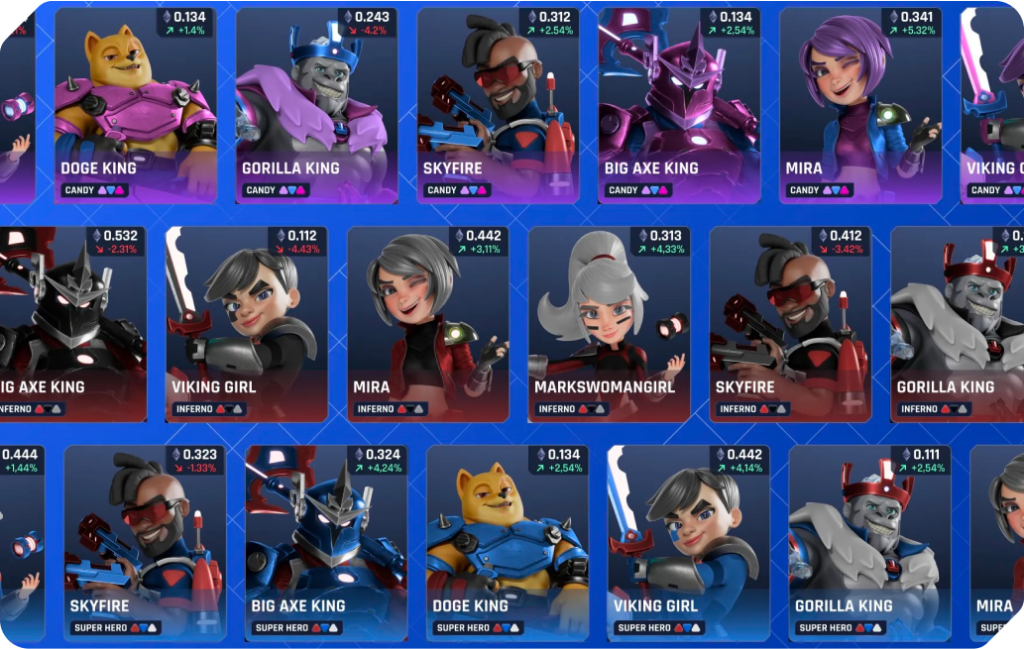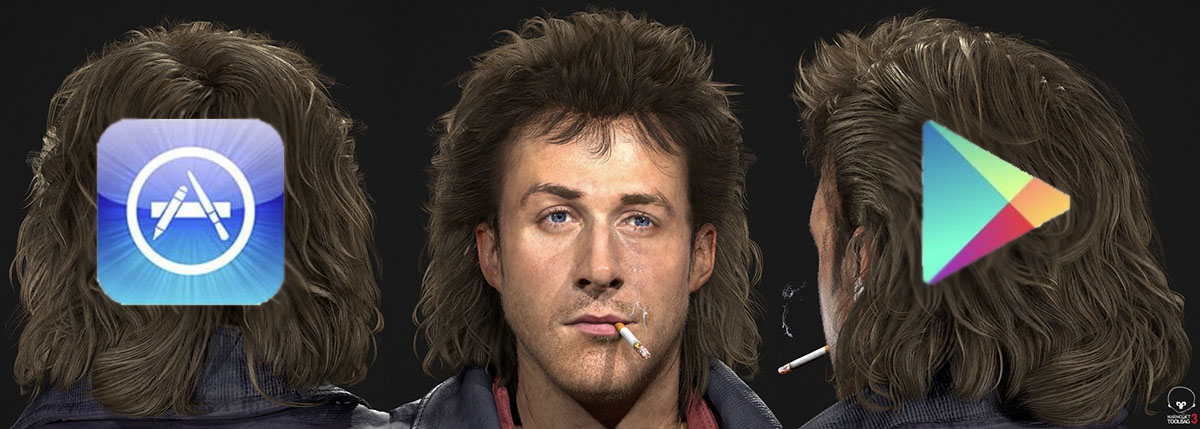A grand experiment in blockchain gaming is underway and we at Double Coconut are proud to be a small part of it. [Collaborations with Splinterlands and Sky Mavis to be announced soon!]
Some call these experiments ‘mullet games’ – serious free-to-play gameplay up front and wacky web3 party out back. The goal is to create a damn good game – one that has the easy onboarding, fun core loop, and strong retention of any hit mobile title with a layer of added value for advanced players whereby they can own and trade assets in a free-form, open manner.

Trying to figure out Apple’s App Store and Google Play’s rules around NFTs and cryptocurrencies can be, well, cryptic. Here we attempt to summarize what is and isn’t allowed with some clear examples.
NOTE: This post was not written by someone with any legal know-how, and this isn't a matter of law anyway -- just big-platform partner policy.
Apple App Store
The policy is here. At high level, these are the rules:
- Players can mint, transfer, buy, or sell NFTs in the game – from you, the publisher, or from each other.
- This must occur through normal In App Purchases (IAP).
- NFTs bought outside of the Apple IAP can be browsed / viewed in some sort of album but can’t unlock features or functionality in the game.
- NFTs bought as IAPs can, well, function like any other virtual good – consumable (Gems to rush the construction of a building) or permanent (a pack of new levels).
- No shilling or links out to external NFT marketplaces, etc.
This means:
- As with any other IAP, Apple will take its 15 to 30% cut of sales (depending on whether you qualify as a ‘small publisher’ or not).
- All transactions must be via USD / fiat. Not crypto. No wallets or crypto-tokens are allowed to make these purchases.
- There can’t really be auctions or variable offers for NFTs – just flat pricing – which makes ‘marketplaces’ difficult. Having prices defined by market forces is part of the thing that makes NFTs interesting, so this is a bit of a downer. That said, some publishers have introduced a special hard currency to allow for variable pricing of NFTs.
- Secondary sales between players will also need to use IAPs, meaning a 15-30% haircut – making most sales unprofitable. Compare this to most NFT marketplaces which are removing royalties altogether.
- Listing NFTs will involve a deeper App Store Review to verify that the origin, ownership, and provenance is legit.
To get around the issue of auctions and secondary sales,, players who wish to maximize their digital assets seem to eventually figure out how to use a web-based NFT marketplace like Magic Eden or Open Sea, or one built by the game publisher themselves. The asset is, after all, decentralized and living on an open blockchain.
Google Play Store
Check the main policy and some further examples/details and blog post. Google overall seems more permissive in terms of how NFTs can be sold and their use of wallets/cryptocurrencies, but is very touchy about anything that may be seen as gambling.
The yeses:
- Games can sell or reward users with tokens or NFTs.
- NFTs can be purchased as in-app items, like any virtual good / consumable to equip your character or unlock cool stuff in the game.
- While not fully clear, it seems NFTs can be purchased by a cryptocurrency as long as the game connects to a reputable wallet / exchange.
- Of course the NFT can also be purchased as a typical in-game product and Google Play will apply its existing IAP fees – taking a 30% cut from app developers who make over $1 million annually, and 15% from those making less.
The nos:
- No gambling, even social casino games where NFTs can be won.
- No loot box type mints where you pay and may earn NFTs of random rarities / values.
- No staking, speculation, etc. where holding NFTs earns some cryptocurrency or other NFTs.
- You can’t imply that playing or owning “Tokenized Digital Assets” in your game is an investment or will ever earn the player anything other than a bit of fun.
What About PC? Epic & Steam
As a bonus off-topic bit — the rules around desktop games on Epic Game Store and Steam are pretty clear:
Steam: Stay the heck away. Blockchain tech / NFTs are explicitly not allowed.
Epic: Any legitimate blockchain game can be distributed. The game publisher is responsible for making the user experience a good one and for being in compliance with all relevant laws and regulations. Full guidelines are here.
- No links to external marketplaces. Must be able to buy / sell the NFTs from within the game.
- No gambling.
Case Studies
Axie Infinity – Origins
Still in soft launch and only available in certain countries, Axie Infinity – Origins is a good example of how NFTs can be blended in smoothly to a more traditional game’s flow. The publisher, Sky Mavis, worked closely with Apple and Google to come up with a title that can appeal to casual game players as well as web3 aficionados.
- A completely free-to-play game where teams of Axies — cute but deadly monsters — fight each other for dominance.
- Get going with “Starter Axies” that aren’t NFTs. A good way to ‘test out’ the game. You start with a handful and can earn up to 10.
- As you get more interested in the strategy you can connect to your Sky Mavis account and use ‘real’ Axie NFTs that you have obtained elsewhere, outside of the game.
Interestingly and notably:
- There are tournaments and events where the SLP cryptocurrency can be won. Only those playing with real NFTs can earn SLP.
- SLP earned ‘in-game’ can be claimed and then minted on the blockchain through a separate web site called the Axie Portal:

- Blockchain-based SLP from your wallet can be deposited back into the game to be used for crafting and leveling up characters – but interestingly this can only be done on the desktop or side-loaded APK version, not on the app from the Google Play or Apple App Store.
NFL Rivals
Mythical’s game has gained over four millions downloads across iOS and Android. A really well-done football tactics game, the blockchain pieces are “snuck in” without much fanfare.

- Default NFL player cards (colored gray) can be earned as you progress. Form a team and enjoy gameplay in a typical free-to-play manner.
- You can of course buy “loot box” packs of these cards and hope to get lucky.
- You can also buy “rare” player cards with colorful red or blue backgrounds for extra-powerful stats. Shh… these cards are NFTs!

- Rare cards can sometimes be won via tournament play.
- Rare cards can be leveled up through gameplay and eventually re-sold with their upgraded stats.
- They can’t be traded in the game (yet) but this feature may be coming soon.
NFTs can only be purchased for a special, separate hard currency called Credits. Credits may only be purchased via IAP — giving Apple and Google their 15-30% rake:

In addition to the deluxe packs with a guaranteed rare cards, there’s a marketplace in game where you can buy other people’s NFTs for Credits:

There’s also of course the Web-based marketplace where you can buy, sell, or trade NFTs for the Mythos token ($MYTH) and those cards will then appear in your in-game inventory. This method essentially lets players get the same NFTs without the 30% tax to Google or Apple.
Notably, the Web marketplace is not linked to or advertised within the mobile game itself.
Crazy Defense Heroes
Animoca’s Crazy Defense Heroes tower defense game made a lot of changes recently to conform to Apple and Google’s policies.
- There are now NO NFTs in the mobile game. Rather, all of the units and cards are “normal” in-app-purchases you can buy or earn by opening chests, enhanced with hard currency.
- Can connect your account via Email/Password, Google or Apple to both the mobile game and via the Tower web site.

And then on the web site you can link your account to your crypto wallet:

Once you connect, you can Get Daily Rewards of the $TOWER token if you hold an NFT and play the mobile game (earning stars).

You also can share in a reward pool by playing a lot and earning XP.
Heroes of Mavia
This is a Clash of Clans style game that claims over a million mobile downloads. They got big by giving a free airdrop of $MAVIA tokens to some of the initial players.
The game feels like any other free-to-play title. But as you get more into the game you can unlock “Legendary” items which are — you guessed it — NFTs.
- Add a wallet to join clans and get $MAVIA rewards if you win tournaments.
- While not active yet, the company has announced the ability to trade Legendary Items in the game itself or via the web-based Ruby marketplace.
- While tokens cannot be spent in the mobile game (per Apple policy), holding tokens earns in-game rewards, such as cosmetics and skins.

Crypto Dragons
This game, published by Realis, has over a million downloads. It is only available on Google Play, but not Apple – most likely due to the ability to purchase and exchange tokens externally.
A fairly simple but well-done merge game, players can eventually complete quests and earn the LIS current which they can (eventually!) transfer to their Polygon wallet for withdrawals or trading — where it is worth around 1 cent.
Players can create a Realis ID using their Google account, and then visit the website where tokens can be withdrawn.
Interestingly, players can subscribe to memberships to give themselves more online and offline in-game income as well as gold or diamond chests that contain better quests — increasing their chance of earning more LIS.

Wrapping Up
These case studies have a few things in common:
- A game that’s fun and fully playable in its own right — without any fancy-shmancy crypto tokens or NFTs.
- NFTs providing more power and depth in the game.
- Advanced players may use NFTs that they already own or obtain from external marketplaces, but there’s no seamless pointers in the app to these marketplaces.
- Purchasing NFTs in game is fine as long as it’s clear and obvious what you’re buying and involves a standard In-App Purchase. A proxy currency may be purchased via IAP to buy these NFTs.
- The game may reward players a currency that can later be transferred to the blockchain as a token and may have real value — again, something that the app itself isn’t promoting but that advanced players may figure out.


Leave a Reply